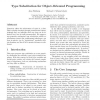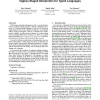1392 search results - page 6 / 279 » Staging generic programming |
112
click to vote
PLDI
1999
ACM
15 years 6 months ago
1999
ACM
Previous selective dynamic compilation systems have demonstrated that dynamic compilation can achieve performance improvements at low cost on small kernels, but they have had diff...
119
click to vote
OOPSLA
1990
Springer
15 years 6 months ago
1990
Springer
Genericity allows the substitution of types in a class. This is usually obtained through parameterized classes, although they are inflexible since any class can be inherited but i...
FSS
2008
15 years 2 months ago
2008
In this paper we propose a generic methodology for the automated generation of fuzzy models. The methodology is realized in three stages. Initially, a crisp model is created and i...
117
click to vote
ICFP
2002
ACM
16 years 2 months ago
2002
ACM
Multi-stage programming languages provide a convenient notation for explicitly staging programs. Staging a definitional interpreter for a domain specific language is one way of de...
218
Voted
POPL
2006
ACM
16 years 2 months ago
2006
ACM
We present staged allocation, a technique for specifying calling conventions by composing tiny allocators called stages. A specification written using staged allocation has a prec...


